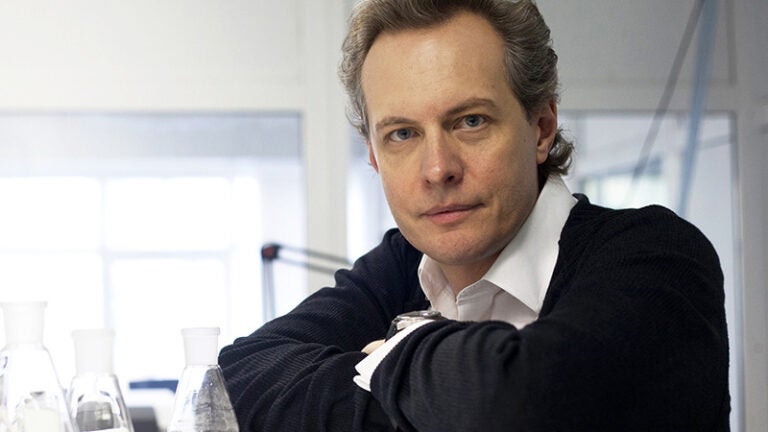
Partnership forms new center aimed at supporting convergent bioscience
The USC Michelson Center for Convergent Bioscience, which opened its doors in October 2017, brings together a diverse network of expert scientists and engineers from USC Dornsife, USC Viterbi School of Engineering and Keck School of Medicine of USC.
In a strategic step to advance the center’s research efforts, they have partnered with Agilent Technologies Inc., a research, development and manufacturing company based in California’s Silicon Valley.
The partnership will establish the Agilent Center of Excellence in Biomolecular Characterization, a facility that will be located inside the USC Michelson Center.
USC Dornsife Professor of Chemistry Valery Fokin is co-director of the Agilent Center of Excellence (COE) with Richard Roberts, professor of chemistry, chemical engineering, and biomedical engineering at USC Dornsife and USC Viterbi.
Roberts, who is also chair of the Mork Family Department of Chemical Engineering and Materials Science, pursues research in peptide and protein engineering and the chemical biology of protein synthesis.
Fokin is best known for “click chemistry,” a method that finds the most reliable chemical reactions to build molecules that can accurately test pharmaceutical drugs. The expertise helped earn him a place on the annual Highly Cited Researchers list for 2017.
“This partnership is very much a two-way street and is much larger than just a physical facility,” explained Fokin. Where USC brings expertise and access to skilled researchers, Agilent brings in cutting-edge technologies that will contribute to COE’s scientific discoveries.
Research will range from developing diagnostics for diseases such as cancer and diabetes to drug discovery. The aim is to transform the way traditional research is conducted — scientists and engineers will work side-by-side to confront the most critical health issues, according to Fokin.
“Convergence means losing the formal disciplinary boundaries — at different levels and with different tools,” he said. “It’s more than just a collaboration.”
Many USC researchers already use Agilent instruments in their labs, so establishing a partnership is a natural transition. But it’s important to note that USC is not a drug discovery company and is more or less “in the business of understanding how things work,” Fokin added. Coupling this with industry expertise expands USC’s opportunity for impact in modern science and discovery.
“External focus is very important at Agilent, and that includes partnering with the world’s leading academic institutions,” said Darlene Solomon, chief technology officer and senior vice president at Agilent. Solomon was also honored with USC Viterbi’s Daniel J. Epstein Engineering Management Award in April.
Recent Agilent innovations include a novel color stain for easier cancer diagnosis within skin and lung tissues and new software to help reduce the cost of managing electronic data associated with long-term storage requirements.
In an effort to make the Agilent Center of Excellence a leader in modern science, showing that more can be discovered through collaboration than separately within isolated disciplines, USC researchers will work with Agilent researchers and customers, providing learning opportunities such asjoint seminars.
The opening of the Agilent Center of Excellence has two phases, with the first slated to begin this summer. It is scheduled to be fully open for operation later this year.
About the USC Michelson Center
The USC Michelson Center for Convergent Bioscience brings together a diverse network of premier scientists and engineers under one roof, thanks to a generous $50 million gift from orthopedic spinal surgeon, inventor and philanthropist Gary K. Michelson and his wife, Alya Michelson. At the Michelson Center, scientists and engineers from USC Dornsife, USC Viterbi and Keck School of Medicine are working to solve some of the greatest intractable problems of the 21st century in biomedical science, including a fundamentally new understanding of the cell and new approaches to cancer and neurological and cardiovascular diseases.